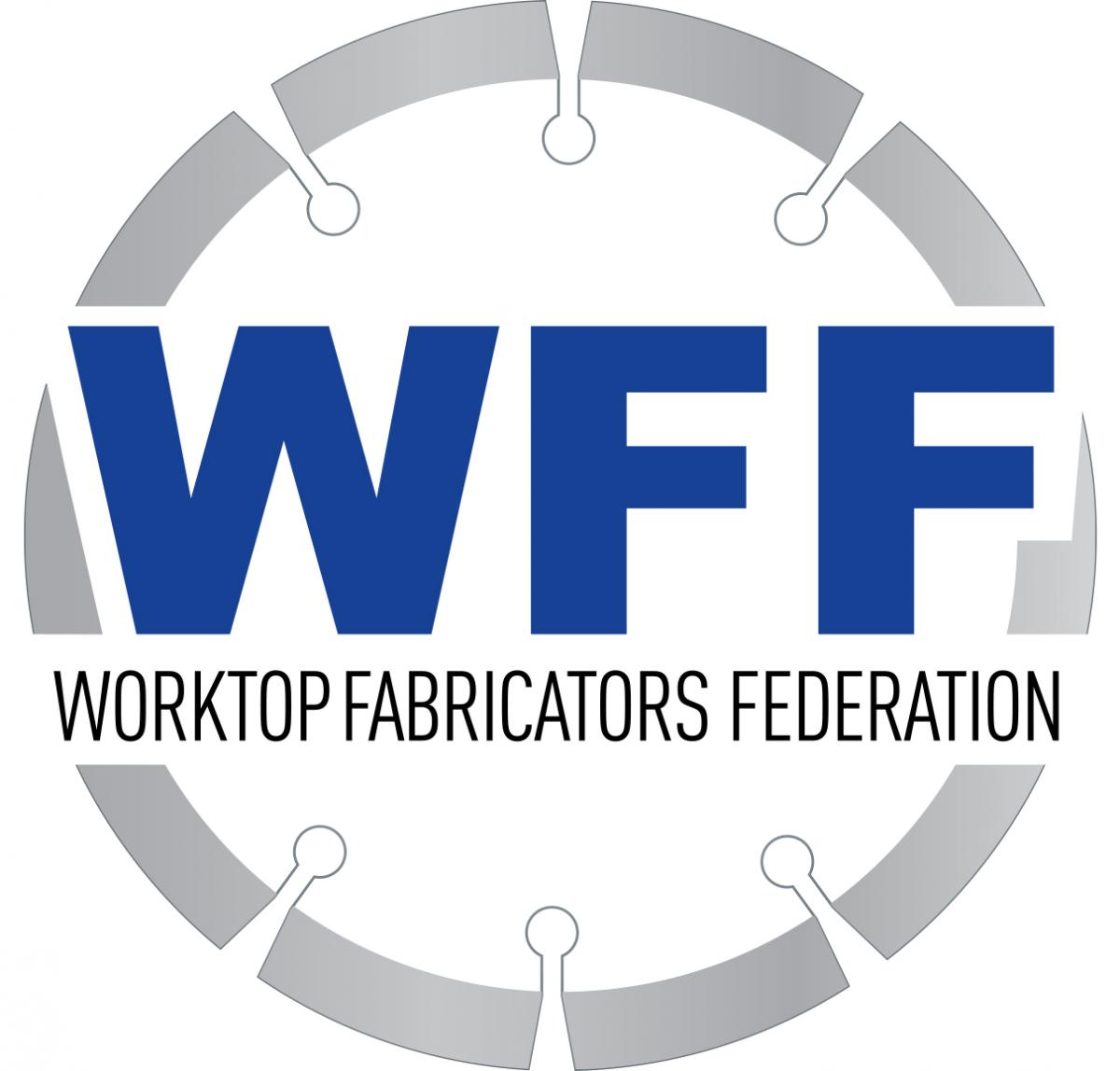
Members of The Worktop Fabricators Federation met on 21 July at the Technical Centre of machinery company Intermac at its headquarters in Daventry, Northamptonshire.
General Secretary Chris Pateman reported afterwards:
It was great to welcome so many folks to last week’s WFF Members meeting, and our thanks again to Andrew, Roberto and Laura at Intermac for their kind hospitality.
As a Federation, we are committed to professionalism, transparency and raising standards. So we thought it worth repeating in detail two parallel pieces of work your directors are proposing to address members’ concerns about post-installation customer call-backs, product quality issues and compensation.
Project 1 – Suppliers’ Tolerances
This emerges from the extensive (and ongoing) e-mail discussion about flaws, marks and failures in the materials supplied, and the extent to which fabricators can reasonably be held responsible. The specification may be generated by the stone supplier, but the reputational risk if the as-installed product subsequently fails to meet customer expectations sits with the fabricator.
The point was made that the role of WFF members is to fabricate the materials suppliers have provided. If the materials that have been supplied are subsequently discovered not to be fit for purpose by reason of some innate fault or flaw in the material, it is unreasonable to expect the fabricator to de-install, re-fabricate and re-install entirely at the fabricator’s expense.
How do we reconcile flaws which suppliers declare “acceptable within the product specification”, but which are not acceptable to the customer? The answer is to manage customer expectations.
The proposal: to poll suppliers for their (either published or internal) guidelines for what is “acceptable within the product specification” in terms of bowing, colour variations, inclusions, what constitutes an imperfection, etc (ie anything else that customers complain about). And then to summarise this in a WFF document that can be shared with customers at the pre-templating stage.
Result: the customer can’t say he didn’t know in advance what risks he may be taking if he specifies such-and-such a product. Clarity between faults which are the responsibility of the fabricator and faults which are the responsibility of the supplier. Opportunity to pre-emptively flag up risks around notoriously problematic colours or materials and manage pricing and delivery expectations accordingly. Professional and informed discussion, rather than blame-shifting.
Project 2 – Fabricators’ tolerances
Acknowledging the specific competences of the fabricator, we undertake a similar exercise polling WFF members and machinery suppliers: what are the fabricator’s tolerances? Measuring tolerances ± Xmm per linear metre; radius tolerances; overhang tolerances…
TEST: how far would this information be useful collateral for stone suppliers’ specification/architectural sales teams?
Result: expectation management at an early stage, avoiding awkward or highly risky specifications before we reach the stage where the fabricator is expected to undertake them. Facilitates new conversations with kitchen studios: “these are the tolerances you can expect from a WFF member – if your supplier’s not a member, are you sure they’ll be able to deliver to this spec..?”
That’s all easy to say, of course.
We had a lively and challenging discussion at the meeting, which went on through lunch and into the afternoon. And it isn’t concluded yet: we do encourage and expect WFF members to criticise and finesse it into something that will be genuinely fit for purpose.
We don’t think this is a magic wand solution. But we do think it is a sensible basis from which both suppliers, fabricators and machinery specialists can all start to work together, referring to hard engineering facts, to manage customer expectations in a reasonable and pro-active manner. Something that can start pretty high-level and be developed and improved over time.
We believe that if we can create something everybody in the industry can refer to with confidence, it will be easier to have those necessary conversations with kitchen showrooms and architects about the inadvisability of telling people that, hey, it’s stone: indestructible; you can take a red hot pot and just put it right on the surface….
What do you think? What kind of internal documents do you maintain to guide showroom and specification sales people and workshop managers in the art of the technically possible? Or to demonstrate the plusses and minuses compared with, say, timber or Corian?
Other industry organisations are already taking action to manage customer QC issues. I was particularly impressed with the Contract Flooring Association’s industry-agreed datum on visual or patterning flaws:
- Visual effects (potential defects) should be inspected from a normal viewing position either standing or seated. When viewing the floor, only those features which would be immediately obvious to any independent party should be considered as potential issues. Careful positioning of backlighting, unusual viewing angles (crouching or kneeling etc.) would not be considered reasonable criteria for identifying a visual defect.
- The overall appearance of the floor should be consistent (product and installation) unless intentional as part of the product design or pattern and therefore unavoidable.
Nothing, of course, to stop you from going over and above that kind of guidance. But helpful, perhaps, in terms of reputation management and industry professionalism to be able to have a conversation with the customer which starts on the basis of “look, this is what the industry-agreed standard looks like…” before going on to “…In your case, I’m happy to offer X, Y and Z.”? Maybe gives the fabricator a little more control of the conversation than he presently enjoys?
We look forward to hearing your thoughts.
Contact Chris Pateman, WFF General Secretary: 07366 391105 / administrator@worktopfabricators.org.
Report in September issue of Natural Stone Specilaist magazine:

General Secretary Chris Pateman led a discussion about fabricator production tolerances as WFF members met face-to-face again.
Sometimes customers are not happy with their worktops. Minor blemishes or colour changes that were not, perhaps, apparent in the workshop where the counters were made show up under the different lighting conditions of a customer’s kitchen or bathroom. But who’s responsibility is it?
Terms and conditions imposed by some of the companies that supply the slabs make it perfectly clear what they will and, more specifically, what they will not take responsibility for. But most worktop fabricators do not have terms and conditions specifically established when they supply a customer.
The Worktop Fabricators Federation (WFF) is planning on changing that by creating an industry standard set of terms and conditions that all companies can work to.
The proposal for the industry standard was put to WFF members at their first face-to-face meeting of the year following the easing of Covid restrictions. Host for the event was machinery supplier Intermac, which welcomed the WFF to its Technical Centre in Daventry, Northamptonshire.
Some WFF members were concerned that they might not want to upset an important customer by saying they were not responsible for a problem. But General Secretary Chris Pateman pointed out that any company would be at liberty to offer more than the industry standard to anyone it wanted to, but if it had a customer who was being unreasonable it could fall back on the industry standard to protect its position.
Other issues covered during the day-long meeting included the increasingly significant issue of mental health, which has overtaken back ache as the most common reason for sick leave.
Although this was a face-to-face meeting, Peter Kelly, Senior Psychologist at the Health & Safety Executive, joined it by Zoom to address the WFF members.
He said sickness absense due to mental health issues had increased 20%. During the first lockdown people had adapted and coped but as restrictions had continued in various forms, socially distancing became socially disconecting and stress had increased. That had led to more mental health issues. He said firms should show compassion.
Mark Bennet of Trolex also gave a presentation of his company’s air monitoring products for measuring dust levels.
 Ben Prole, Sales Director of Bellagio Stone in Warwick, is welcomed as a new Director of WFF. Pictured (L-R) are WFF General Secretary Chris Pateman and Directors Mark Mills, Ben Prole, Simon Souter and Andy Phillips.
Ben Prole, Sales Director of Bellagio Stone in Warwick, is welcomed as a new Director of WFF. Pictured (L-R) are WFF General Secretary Chris Pateman and Directors Mark Mills, Ben Prole, Simon Souter and Andy Phillips.

